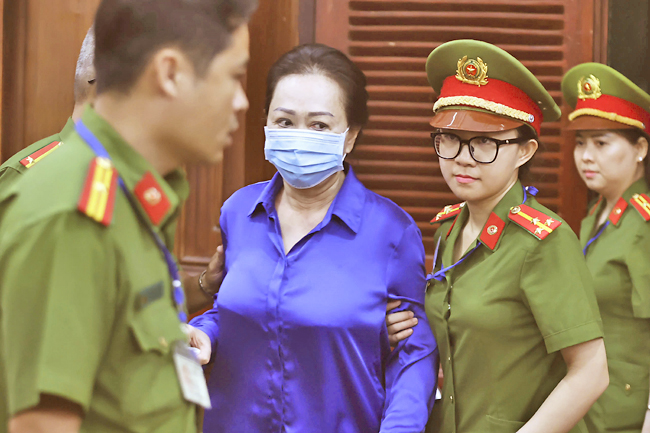HO CHI MINH CITY (AFP) – A Vietnamese property tycoon sentenced to death for fraud totalling USD27 billion arrived in court yesterday to face a potential life sentence in a related trial on money laundering charges.
Property developer Truong My Lan was found guilty in April of swindling cash from the Saigon Commercial Bank (SCB) – which prosecutors said she controlled – in one of the biggest corruption cases in history, and sentenced to death.
Tens of thousands of people who had invested their savings in the bank lost money, shocking the nation and prompting rare protests from the victims.
Yesterday, Lan and 33 other defendants – including her husband and niece – were brought to court in Ho Chi Minh City in a convoy of police vans. Wearing a face mask, Lan sat at the front of the court flanked by two police officers to await the verdict after a four-week trial.
Prosecutors have called for a life sentence for Lan on charges of money laundering, illegal cross-border trafficking of cash, and fraud.

Around 36,000 people who bought bonds issued by SCB have been identified as victims of the fraud.
Online noodle seller Nguyen Thi Huong told AFP she wanted to die after losing USD20,000, her entire savings, in 2022.
“When I learned that I had lost all the money I had deposited at SCB Bank, I felt like I was losing my mind,” said Huong, 33. She developed insomnia, her health deteriorated from stress and she no longer had money to send her children to extra classes, making them fall behind their peers, she said.
“I sat by my father’s grave, and wished he would take me with him in death,” Huong said.
State media reported earlier that Lan and her associates stole around USD18 billion by taking assets from SCB between early 2018 and October 2022. Lan effectively owned a 90-per-cent stake in the bank.
Lan, who was chair of major real estate developer Van Thinh Phat, ordered her accomplices to withdraw cash and transfer it out of SCB’s system, state media said.
She then hid the origins of the money and used it to settle debts between companies or transferred the money abroad for fake contracts.




